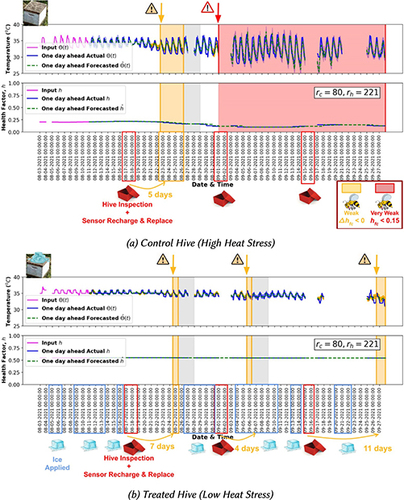AI-Powered Early Warning System for Honeybee Colony Health
Full Description
Background
In 2024, more than 60% of managed honeybee colonies were lost, posing a significant threat to global food production. Honeybees are essential pollinators for over 80 key agricultural crops. However, beekeepers currently lack effective tools to detect early indicators of hive health decline, often intervening only after irreversible damage has occurred. There is an urgent and growing demand for a reliable, cost-effective, and predictive system that can provide early warnings and support proactive high management.
Technology
The Electronic Bee Veterinarian (EBV) is a predictive health monitoring system that quantifies beehive health in real time. It analyzes hive temperature data by modeling the colony's thermoregulation capability using the thermal diffusion equation and a bio-inspired sigmoid (P) feedback controller. EBV not only detects anomalies in bee behavior and forecasts the hive's core temperature days in advance, but also it generates an interpretable "hive health" score - a direct, quantifiable measure of the colony's ability to maintain its core temperatures. This enables beekeepers to identify early signs of stress and take timely action to prevent colony collapse.

EBV forecasts (dashed green line) the next day's core temperature (solid blue line) well and raises flags (orange vertical lines) followed by unexpected events (red boxes: intensive high inspection, sensor recharge and replace). It also raises alarms (red vertical lines) if h falls below a threshold: very weak bees. (a) Control hive (high heat stress). (b) Treated hive (low heat stress).
Advantages
- Accurately forecasts hive temperature and provides early alerts of potential threats to colonies.
- Generates interpretable and explainable hive health score, designed for easy understanding by beekeepers.
- Enables preventative measures by beekeepers, significantly reducing the risk of colony collapse.
- Computationally efficient, thus cost-effective for real-time monitoring of small and large-scale colonies.
- Grounded in established scientific principles, and provides a reliable and trustworthy analysis.
Suggested uses
- Commercial beekeeping
- Precision agriculture
- Smart hive technology
- Environmental research for studying the impact of climate and other stressors on bees
State Of Development
Proof-of-concept has been successfully demonstrated and validated using multiple real-world datasets from active beehives.
Related Materials
- Please visit the Center for Integrative Bee Research (CIBER) to learn more about their research at UCR
- Please visit UC Riverside Artificial Intelligence Research and Education Institute (RAISE) to learn more about AI at UCR
Related Materials
Patent Status
Patent Pending
Contact
- Venkata S. Krishnamurty
- venkata.krishnamurty@ucr.edu
- tel: View Phone Number.
Other Information
Keywords
honeybee health, predictive analytics, time series forecasting, beekeeping, precision agriculture, colony collapse, apiary management, explainable AI
